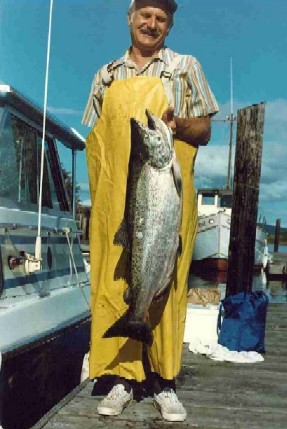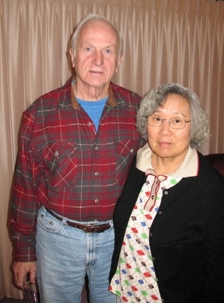The Times, They Have 'A Changed
Picture the 1970's: jobs on the decline, unrest in the steamfitters' union about job security, dissatisfaction with the leadership, and upheaval from Vietnam, Watergate, and the oil shocks.
Those were the tumultuous days in which Greg Deblock cut his teeth on union politics. The retired business manager and organizer from Steamfitters Local 235, which later became UA Local 290, spends more time than he wants looking back these days. In November of 2006, Greg was diagnosed with malignant mesothelioma, a cancer of the lung linings caused by asbestos.
In the summer of 2006, Greg began having shortness of breath. He went to his primary care physician who took a chest x-ray that revealed a pleural effusion. His doctor referred him to a specialist who performed two thoracenteses. On each occasion, over one liter of fluid was removed. As the fluid returned and Greg continued to experience shortness of breath, his doctor performed exploratory surgery to determine the cause.
During the surgeries that took place at Providence Medical Center in Portland, Oregon several tissue specimens were removed. The diagnosis was malignant mesothelioma. His treating physicians decided that his best hope was to begin with chemotherapy to shrink the tumor, and follow with major surgical intervention.
In November 2006, Greg began his first of six treatments with induction chemotherapy consisting of Alimta and Cisplatin. On January 8, 2007, Greg had another CT scan that showed minimum regress, despite his induction chemotherapy treatments. His primary care physician and surgeon described surgical options including extrapleural pnuemonectomy (EPP) to remove the encased left lung.
He struggled to find specialized care in Portland. Despite the area's status as a hotspot for mesothelioma due to its historic shipbuilding and paper mill industries, the closest treatment centers with doctors who specialize in mesothelioma are in Seattle and Los Angeles.
In order to learn more about treating his medical condition, Greg traveled to Los Angeles to consult with Dr. Robert Cameron, a mesothelioma surgical expert at UCLA. "I wouldn't even know about Dr. Cameron if my lawyer, Roger Worthington, hadn't introduced me. It's too bad the local doctors haven't responded to the asbestos epidemic here in Oregon."
Dr. Cameron, Chief of Thoracic Surgery at UCLA, is also the science advisor for the Punch Worthington Research Laboratory, which is investigating ways to reduce risk, diagnose and treat occupational diseases, such as mesothelioma. The PWR lab is named after Punch Worthington, Ph.D, a long time union organizer and asbestos investigator from Salem, Oregon. For more information, see www.phlbi.org.
On February 9, Greg met with Dr. Cameron who after initial examination discussed with Greg the pleurectomy with decortication surgery which would save the underlying lung, followed by radiation and maintenance therapy with interferon. Greg was interested in the P/D but eventually chose to undergo the EPP which was performed on April 27, 2007 in Portland. Close to his home.
"Helping people"
Greg began as a dispatcher with steamfitters Local 235 in 1976. His popularity led him to be elected as financial secretary/treasurer in 1977. Greg became interim business manager when Matt Walters unexpectedly died, and then became business manager at the next full election in 1980. Unemployment was high and the union was in debt, but Greg was able to bring it into the black.

His best memories about the job? "Helping people," he says without hesitation. "You could use your position to resolve disputes, negotiate on behalf of the membership, fight for higher wages-we negotiated the highest percentage wage increase we'd ever had. I'd go talk to other party regarding problems with the work site, or maybe a worker had a personal problem and needed help, and I'd work it out with the other party. Helping our members was at the top of my priority list and it gave me the most satisfaction. I have sat on numerous boards and commissions and used those positions to the benefit of our members and organized labor as a whole."
According to Mike Fahey, former Executive Secretary of Metal Trades Council of Portland and the Vicinity, "Greg was always respected by the people he represented and the employers he negotiated with. He was fair. He had integrity and was greatly liked. He was a welcome addition to any contract negotiations, and respected by the membership because he never forgot where he came from. Greg Deblock was a man who remembered what it was like to carry a lunch bucket and punch a time clock."
Times, however, have changed. "The biggest change is skill development. Steamfitters today have more skills. While the job of steamfitter continues to involve the big pipe fitting type of work, the methods of doing so have also changed. We have evolved into the high tech area of manufacturing., which requires added skills. We have been able to pass these skills on to our members through our state of the art training center, thus making the Portland area one of the premier high tech areas in the world that possesses the skills necessary for high tech manufacturing. Along with these skill developments are the management of those skills. So you see the times have really changed.
"This area is saturated with high tech; Intel, IBM, Xerox, and many others, and the work is more technical than it used to be. You deal with different kinds of welding, high orbital welding instead of plain arc welding. Pipe systems are also designed differently because of the electronics involved. Now valve systems are all high tech, electronic, and automatic, and often as not controlled from remote locations or via satellite.
"For labor the biggest change is the actual amount of physical labor. Nowadays a steamfitter's got to have a license to work on boiler high pressure piping and vessels, licenses for high tech orbital welding, low voltage licenses, and others as well.
"Labor relations have improved, too. We used to be more adversarial, but we don't see so many strikes because we've been able to negotiate contracts that work around them for the benefit of management and labor alike. I'd say there's been a meeting of the minds: in order to get his work done the employer has got to have skilled people. He'll go bust without them, it's been proven time and time again. as we keep adding the skills required by the industry, we become more valuable as a work force and can command a relatively higher standard for ourselves and our families."
When asked about the future, Greg thinks it's pretty clear: "More high tech. More skills in electronics and microprocessing. Less physical demands, more high tech skills if we want to stay in the business, and any other skills the future may require."
*** POSTED OCTOBER 25, 2007 ***
A Conversation with a Union Giant (1/25/07)
Union Giant Changes Oregon Law, Fights the Good Fight. Portland, OR (11/5/07)
Oregon Union Pipefitter Settles Mesothelioma Claim. Portland, OR (11/7/07)
*** Mr. Greg Deblock passed away on October 29, 2007 ***

